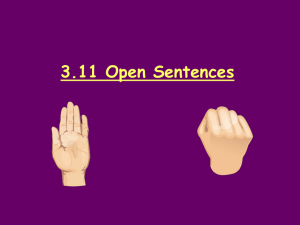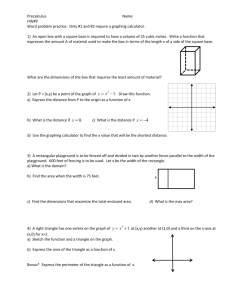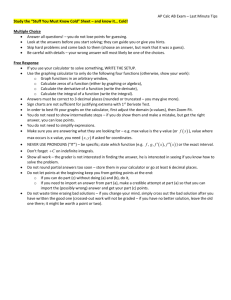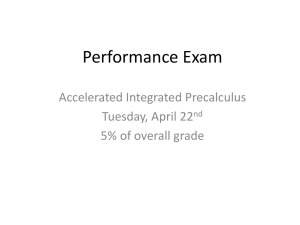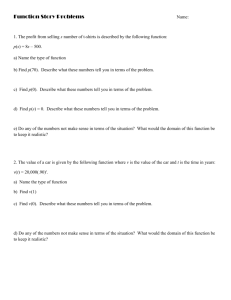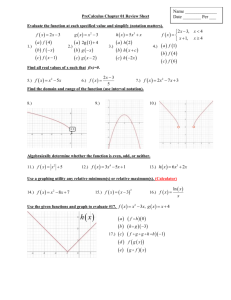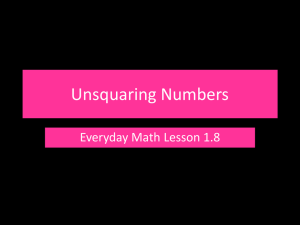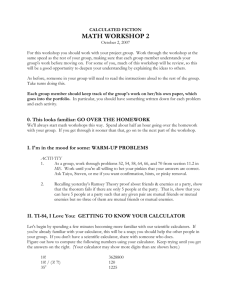GCSE Grade E
advertisement
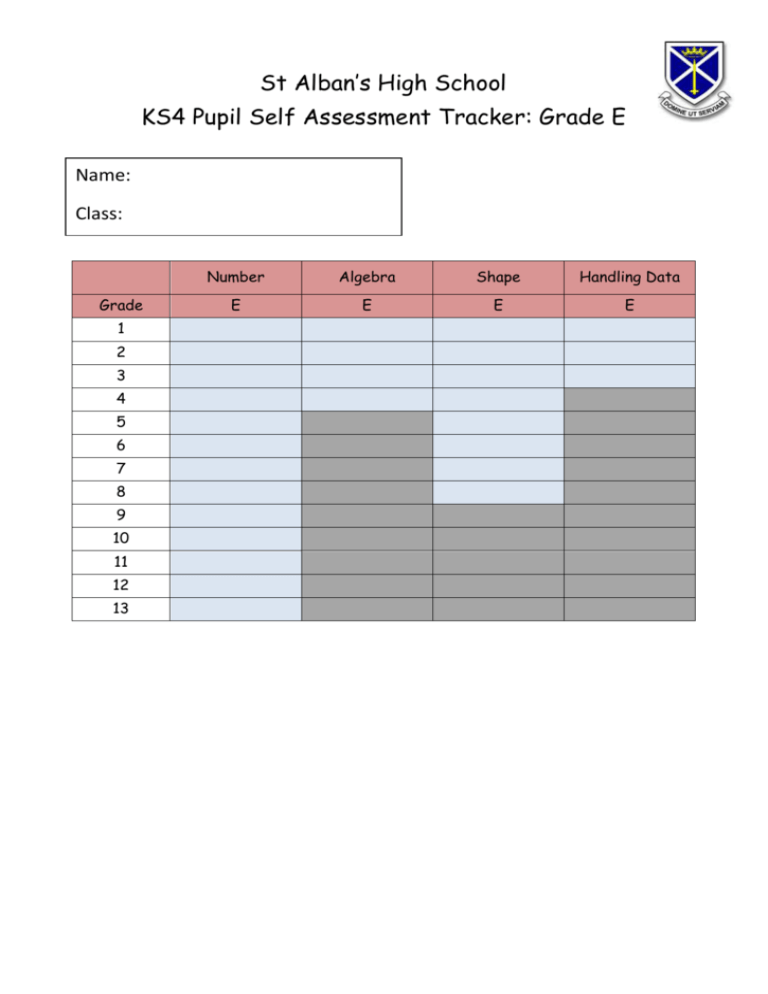
St Alban’s High School KS4 Pupil Self Assessment Tracker: Grade E Name: Class: Grade 1 2 3 4 5 6 7 8 9 10 11 12 13 Number Algebra Shape Handling Data E E E E Number N5.1 Round 12.399 to one decimal place Round 1.618 to two decimal places Round 124.613 to the nearest 10 Round 3295.9 to the nearest 100 Estimate the answer to 37.8 x 51.4 by approximation methods Evaluate 0.70.2 What number do you multiply by 0.6 to get 0.06? N5.2 10۩ = 100000. What is the value of ‘۩’? 104 = .۩ What does the ‘۩’ represent? ۩ 0.2 = 200. What does the ‘۩’ represent? N5.3 ۩ ÷ 10 = 800. What does the ‘۩’ represent? Complete this table: Fraction Decimal 1/5 0.45 Percentage 36% N5.4 N5.5 N5.6 N5.7 N5.8 3/8 Give 5 examples of prime numbers and explain what a prime number is. What is the lowest common multiple of 6 and 8? What are the reciprocals of: (a) 2 (b) 5 (c) 1/4 Write the numbers 108 and 120 as a product of their prime factors. Find the highest common factor and lowest common multiple of 108 and 120. Without a calculator work out 23 x 45 Using this answer what is the solution to (a) 2.3 x 45? (b) 2.3 x 4.5? (c) 0.23 x 450? Without a calculator work out 48/6 Using this answer what is the solution to (a) 4.8/6? (b) 480/6? (c) 480/0.6? What are values of 23, 33, 43, 53, and 103 Write the following using indices: 3x3x3x3, 4x4x4, 7x7x7x7x7 The cost of hiring a van is a basic charge of £43.75 per day plus 24p per mile. Winston hires a van for two days. The mileage shows 23 412 at the start of the first day It shows 23 641 at the start of the second day. When Winston returns the van at the end of the second day the mileage is 23 812. How much will the van hire cost? Without a calculator work out: (a) 4.3 + 12.7 (b) 2.4 x 6.2 (c) 13.62 – 3.9 (d) 24.6/3 N5.9 N5.10 N5.11 N5.12 N5.13 Without a calculator work out: (a) 143 x 17 (b) 304/16 (c) 4.26 x 7.1 (d) 5.23 + 16.728 A recipe for a cake for 5 people requires 300g of flour, 180ml of milk and 80g of chocolate. How much flour, milk and chocolate would you need to make a cake for 8 people? Harry got 21 out of 28 in a Maths test and 14 out of 20 in English. Explain without using a calculator which is the better result. Using a calculator put these 4 results in order: (a) 12 out of 14 (b) 23 out of 28 (c) 83% and (d) 40 out of 49 Without a calculator work out: 4 3 2 (a) 4 + 3 x 5 = (b) 4 + 6 ÷ 3 + 5 (c) 4 x (3 + 5) ÷ 36 4 (d) 2 4 Without the use of a calculator work out: (a) 3 x -4 (b) -7 + 3 (c) -5 x -7 (d) -3 – 8 (g) -20/-4 (e) -6 - -8 (f) -12/3 Algebra A5.1 If m=3, what is the value of (a) 24-2m and (b) 4m+5 If d=12, what is the value of (a) 3(20-d) and (b) d2-24 A5.2 Solve (a) 3x + 5 = 17 A5.3 A5.4 (b) 2x – 5 = 9 (c) 3(x+4) = 27 Multiply out: (a) 3(x+5) (b) 4(e-16) Simplify by collecting like terms: 3w+8-2w+4w2-17 Simplify by collecting like terms (a) p+7+3p and (b) d+3d+2d+d Plot the points (1,2), (0,-1), (-3,2), (-3,-2) and (1,-4). Write down the coordinates of the points that can be joined to make a (a) trapezium, (b) kite and (c) isosceles triangle Shape, Space & Measures Construct an accurate diagram 7cm 6cm of this triangle: 9cm S5.1 A triangle has base length 8cm. The base angles are 39 and 81. Construct an accurate diagram of the triangle. Construct an accurate diagram of the triangle shown: 6.2cm 37 8.7cm Assuming North is straight up the page, what is the bearing of B from A? What is the Bearing of A from B? A S5.2 S5.3 B Use a map and give the four-figure grid references for 3 locations (call them C, D & E) and estimate the distance and bearings from C to D? C to E? and D to E? Draw a sketch of all the quadrilaterals you know and split them into groups, clearly explain your reasons. Now split them in a different way with clear reasons. Look at the net of a cuboid. When it is folded, which vertex S5.4 will meet with point ‘V’ which is marked with a black circle? Sketch two cuboids with a volume of 24cm3 Draw the net of each of these two cuboids Find the area and perimeter of this shape: S5.5 Draw a rectangle with an area of 30cm2 Draw a rectangle with a perimeter of 24cm 6m 9m 4m 5m S5.6 S5.7 S5.8 Draw a shape which has rotational symmetry of order 2 and one which has order 3 Draw a shape which has 1 line of symmetry and another shape with 2 lines of symmetry Plot the points A(3,1), B(6,1) and C(6,5) and join to form a triangle. (a) Rotate the shape ABC 900 clockwise using the point (1,1) as the centre of rotation. (b) Rotate the shape ABC 900 anticlockwise using the point (-1,1) as the centre of rotation. (c) Rotate the shape ABC 1800 using the point (1,-2) as the centre of rotation. (d) Reflect the shape ABC in the line y=x Complete each of the following: 0.2 litres ____ ml 658cm ____ metres 56 grams ____kg ____cm 73mm 293mm ____metres ____mg 2.4 grams Complete each of the following: 8 inches ____cm 44 lbs ____kg 90 litres ____gallons Handling Data D5.1 Give an example of an event which would be placed at ‘0’ on the probability scale below. Give an example of an event which would be placed at ’1’. 0 1 A card is picked from a pack of ordinary 52 playing cards. What is the probability of getting (a) a three, (b) a club, (c) the queen of hearts? Draw an arrow to show the position of each of your answers on a probability scale. Calculate the mean and range for the ‘burn-time’ (in hours) of a torch when using two types of batteries as shown below. Use your results to justify which type of battery you would use. D5.2 EverSteady Ever-Go 6 7.5 5.5 5.25 4.75 5.75 6.5 5.5 7 6.5 2.5 7.75 8.25 7.5 8.5 This Pie Chart represents how Year 6 pupils travel to school. Copy and label the diagram. Draw a similar Pie Chart for Year 11 pupils and write down 3 D5.3 comparisons using the diagrams. 8

